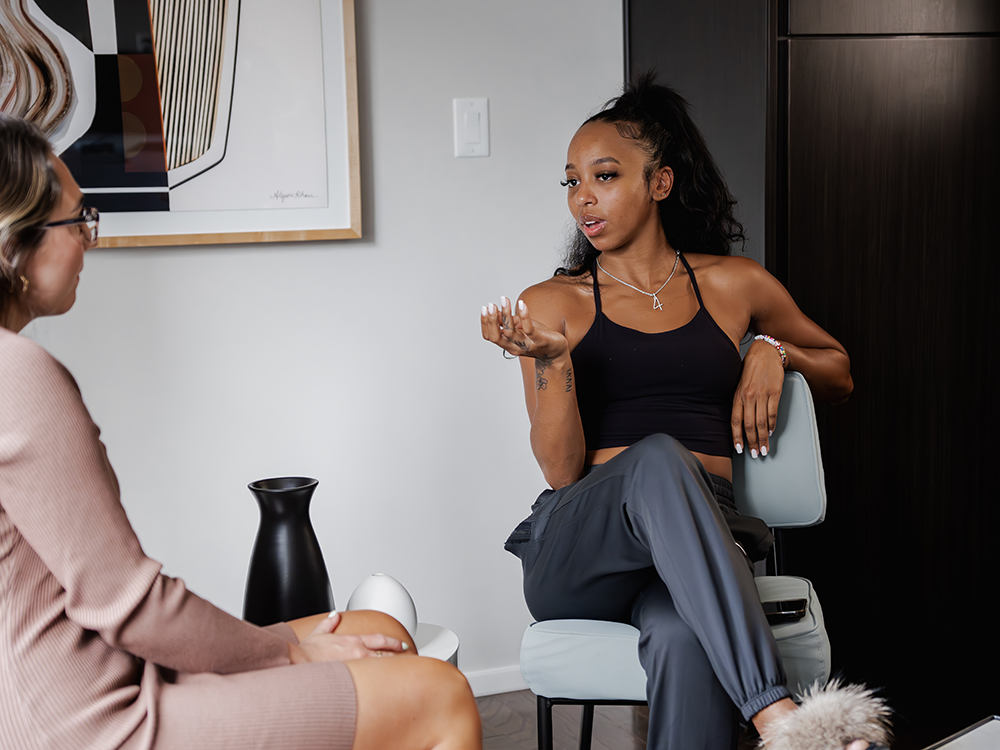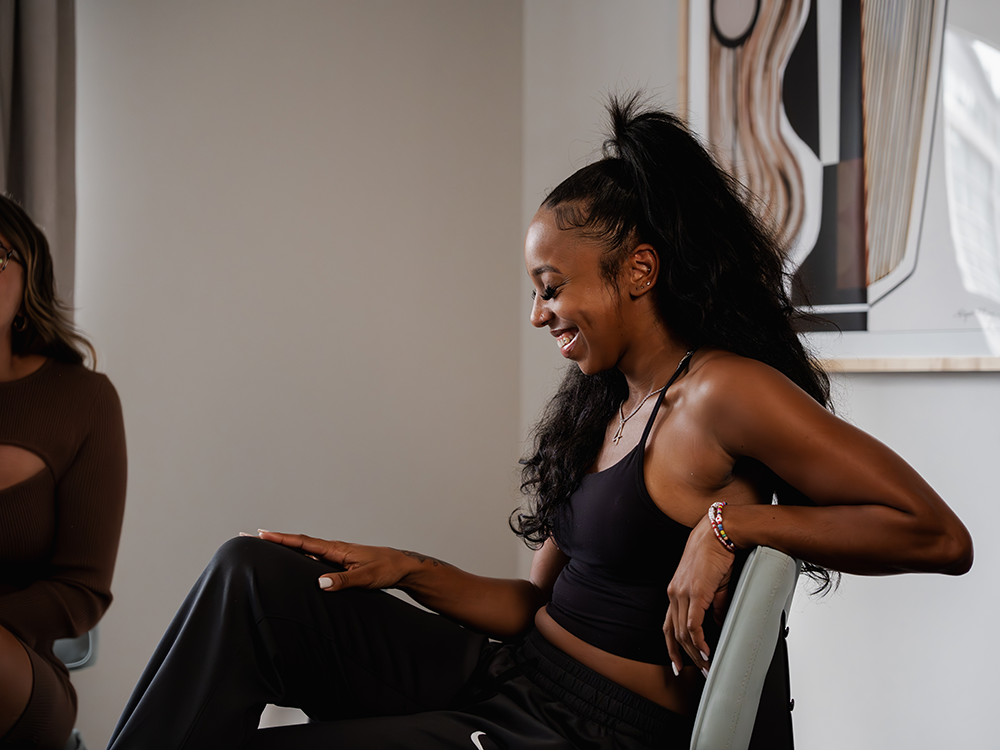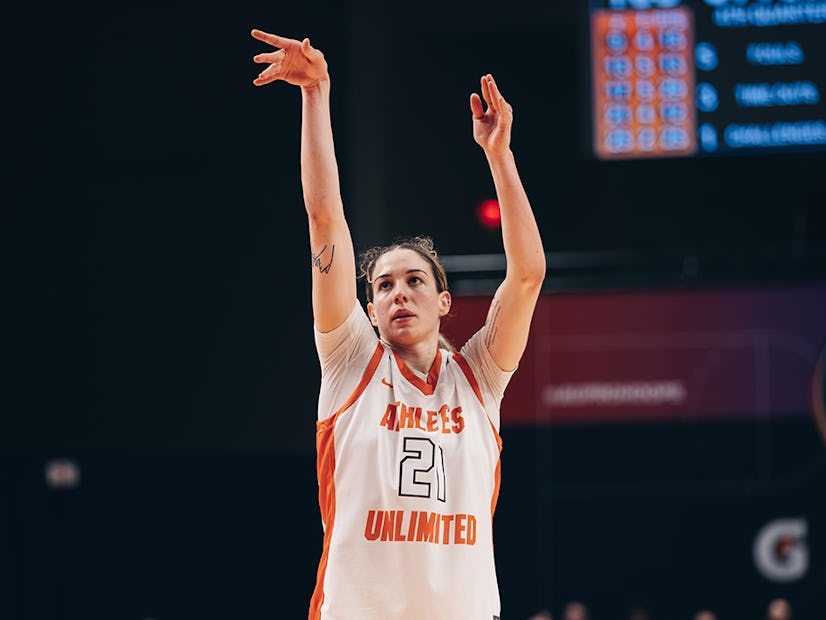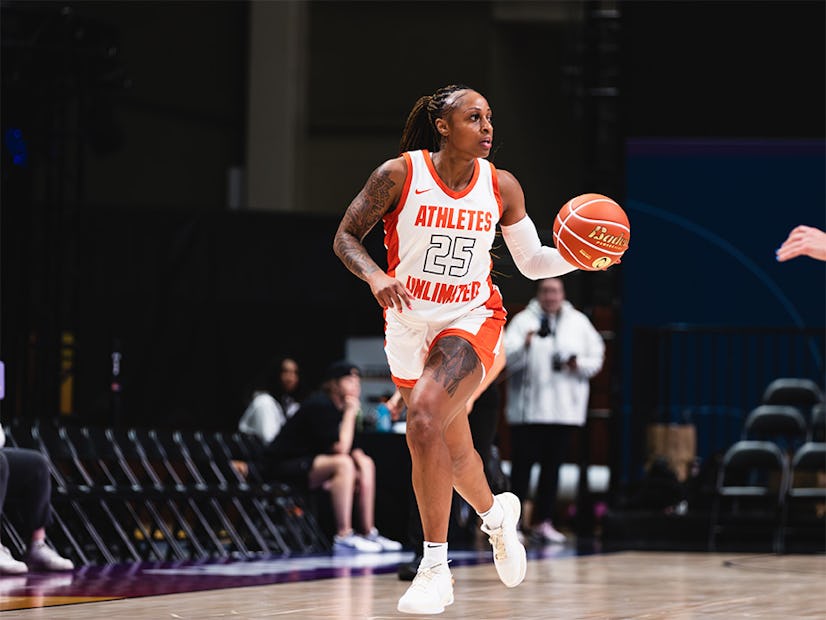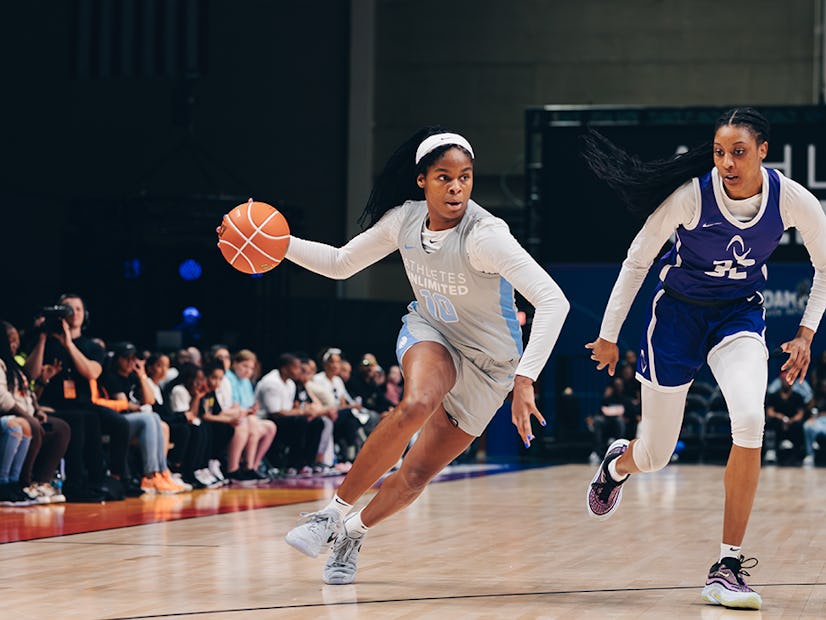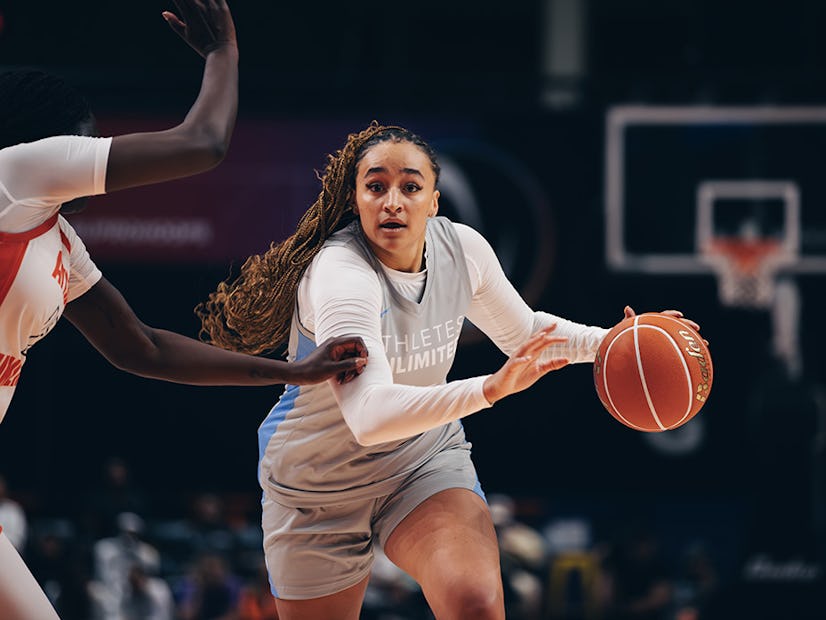
Lexie Brown's battle for her health and basketball
Lexie Brown shares her recent diagnosis of Crohn's disease, her fight for her health, and her return to the basketball court.
“I didn’t think I was going to be able to be healthy enough for AU.”
Ten months ago, Lexie Brown stared into an uncertain future about basketball and her health. Of all the obstacles she’s faced in her career, this was one Brown couldn’t outwork.
Brown battled untreated and undiagnosed Crohn’s disease for the entirety of the 2023 WNBA season. Athletes Unlimited Pro Basketball is Brown’s first step back on the court following almost a year of pain, procedures, and finally recovery.
“Having this league changed my life and it’s allowed me to get back healthy and get back to the level of play,” Brown said.
Crohn’s disease is an inflammatory bowel disease that causes chronic inflammation and irritation of the digestive tract. Brown was diagnosed with Crohn’s in November but the journey to her diagnosis was a long and painful one.
Playing through pain
When training camp with the Los Angeles Sparks started in May, Brown was journaling about her days. In those entries, she wrote about the early signs of not feeling herself; how she didn’t have her usual energy to come in to practice early or pick up extra workouts that she always did on away trips.
By the time the regular season rolled around, Brown was enduring intense pain caused by fistulas. Fistulas are small tunnels that form between two organs or an organ and the surface of the body. Inflammation from Crohn’s disease causes the sores to form. They can make everyday occurrences like walking or going to the bathroom excruciating.
Brown was playing more than 35 minutes per game in the WNBA with the condition. She had a routine she tried to maintain to work around the pain: go to shootarounds in the morning, eat, then go to the bathroom. This gave her enough time to get the pain to a tolerable level and take pain medication right before warmups so she could be ready for tipoff.
She played through it. Through seven games in the season, Brown averaged 16 points per game. She even had a Sparks career-high night putting up 26 points against the Phoenix.
I don't think I'm ever going to be one of the chosen ones in the W and that's why AU is so important to me because we're building something special.Lexie Brown
But an early afternoon game on a road trip to Dallas threw a wrench in her makeshift routine. The team was huddled in the locker room ready to run out when Brown had to sprint away and endured a traumatizing trip to the bathroom.
She didn’t have enough time to let the pain pass. She could barely walk.
“I don’t know how I played that game I was in so much pain,” Brown said. “If I can find any clips of me running during that game, any game actually, it was like I had something stuck inside of me. I was moving very gingerly.”
Brown, recognizing something was wrong, sought medical help for months but hadn’t gone to a colorectal specialist yet. She saw a doctor when she returned to LA after the road trip. The day after, she was in emergency surgery.
It was mid-June when Brown had her first of two procedures to treat the fistulas and control the pockets of bacteria in her body. They had caused an infection and she was nearly septic. She missed a month of games, spending that time letting the fistulas heal but continuing to battle the pain.
“I was just in bed all day doing nothing except getting up and having a horrible time in the bathroom and then just crying. It was just really hard,” Brown recalled. She takes Snapchat photos and videos as a digital scrapbook to look back on. “I had nothing in July. I wasn’t doing anything and I felt horrible… From mid-June to August it’s just nothing.”
“Your body won’t rest until you allow it to”
Brown knew the fistulas were causing her pain but the root diagnosis of Crohn’s disease was still unknown. Meanwhile, the outside noise was loud.
Media outlets, fans, and the usual mob of Twitter anons conjectured why Brown’s status with the Sparks was a “non-covid illness”. Many criticized, accusing her of having a “mystery illness” and being secretive. People demanded answers but there wasn’t one to give.
“There was nothing for me to share,” Brown said. “I was just sitting in a corner like, ‘Okay well, I’m just going to let this ride out’ because the team knows what’s going on, my family knows what’s going on, and that’s all that matters.”
Like every other obstacle Brown had faced in her career, she hoped this could be another that she outworked. “All these years I’ve played basketball, days off time didn’t exist,” Brown said.
That mindset got her to the elite level she is at today but in this phase of her life, it would no longer serve her.
“The universe literally had to take me out for me to be like, ‘Okay, maybe you’re doing a bit too much. You need to take a few steps back and reevaluate how you approach basketball and taking care of your body and health and wellness.’”
When she’d been cut from teams in the past: work hard. When the fear of losing your spot creeps in: work harder. Brown thought she could outwork the pain and push past being tired and sick.
But her surgeon, Dr. Lin at UCLA Health, told her otherwise, “Your body won’t rest until you allow it to.” That candid conversation started to reshape Brown’s perspective and gave her a hard realization.
“That’s when I decided to shut it down for this season, which was one of the hardest decisions I had to make because I was playing so well and it was, I think, a pivotal point in my career in the W that I was having,” Brown said. “It was just snatched for me.”
The Sparks released a medical update on Aug. 29 that Brown would miss the remainder of the 2023 season. It was a definite ending to her season but she still had so much uncertainty ahead.
What she’s wanted all along
Many people affected by Crohn’s disease face weight loss and malnutrition. Brown was no exception. She lost nearly 20 pounds, hadn’t played in a game since July 25, and no longer saw the strong professional athlete she’d spent six years building in the mirror. The Sparks told her to “take her time” but doubts clouded her mind.
Moved to tears, Brown recalled how hard it was to step away for the 2023 season, not knowing if she would play again or if a spot would be there for when she returned.
“They didn’t tell me that, but that’s just how my mind works,” she explained.
On Feb. 6, 2024, Brown signed a 2-year contract extension with the Sparks.
“For them to give me that two-year extension that I’ve worked so hard for in the midst of all of this meant everything to me and people – I don’t think they realize that’s always been my goal.”
Now on medication to keep the fistulas under control, Brown began training again. She worked to rebuild her stamina and muscle and slowly got back to hitting the deep 3-point shots she’s known for.
AU Pro Basketball also extended a contract to Brown; she was one of the league’s first signees for the inaugural season in 2022 and is the chairperson of the Player Executive Committee weighing in on league decisions through the leadership role.
“I think when it comes to basketball, I’m going to be more remembered for what I did with Athletes Unlimited than what I did in the W. Athletes Unlimited didn’t exist when I was growing up or when I was in college.”
She believed in the league before it launched and it believed in her to make her comeback.
“I think I’m actually playing better now than I was playing last summer,” Brown said. “People knew that I wasn’t going to sign something or promise people a version of myself and show up as something less than that. So, I mean, I am just so grateful for everyone who has believed in me throughout this entire situation.”
A name for her pain
Brown didn’t receive an official diagnosis of Crohn’s until November near Thanksgiving. Although her symptoms pointed to the disease, it took months to see a gastrointestinal specialist who could give her the diagnosis. Brown began taking medication called Remicade which she receives through an IV infusion. It’s a common medication for Crohn’s that can block a specific immune antibody that causes inflammation in different autoimmune disorders.
Nearly 1 in 100 Americans are diagnosed with inflammatory bowel disease (IBD) and while it can occur at any age, Crohn’s is most often diagnosed between the ages of 20 and 30. Doctors and researchers are still seeking an explanation for the cause and a cure.
Brown is playing for the Crohn’s and Colitis Foundation of Greater Los Angeles/Orange County. The non-profit is dedicated to finding cures for Crohn’s disease and ulcerative colitis, and improving the quality of life for those with these diseases. A grant equal to 100% of Brown’s end-of-season win bonus will be donated in her name to the organization.
When Brown arrived at AU Pro Basketball in February, she was on limited minutes and thought that might be the reality for the month-long season. But after Week One and three games behind her, she felt good. After flying home for her Remicade infusion, she felt even better.
With just two games remaining, Brown is eighth overall on the leaderboard. She’s one of the top stat point earners this season shooting 41.6% from the floor and 33.3% from three.
When asked about this version of herself – the one who balances rest and is honest about how she’s feeling but is still competitive – Brown smiles.
“I like her,” she reflects. “She’s still very private and still works really hard, but she’s really at peace with herself.”
What Brown is no longer private about is her diagnosis and struggles with Crohn’s.
“The first step to living a better life is just being honest with yourself and being honest with the people around you and taking those days when you need them,” Brown said.
She no longer fibs with an “I’m fine” when asked how she’s doing. She’s honest and is sharing her experiences with the disease so others feel less alone.
The first thing Brown googled after her diagnosis was “professional athletes with Crohn’s disease.” The results were limited.
Now, Brown’s name will come up in that search along with all her accomplishments: the two-year extension with the Sparks, her soaring comeback with AU.
That’s her message to others diagnosed with the disease: we’re out there and we can thrive.
Savanna Collins is the Senior Reporter at Athletes Unlimited. She was diagnosed with Crohn’s disease in September 2019. You can follow her on Twitter @savannaecollins.

Join the Unlimited Club
Unlock exclusive benefits with your FREE membership
Benefits
- Follow Your Favorite Sports
- Enjoy Virtual Fan Events
- Chat on the Community Board
- Vote for Game MVP, Seasonal Awards
- Play in the AU Fantasy League
...and more



